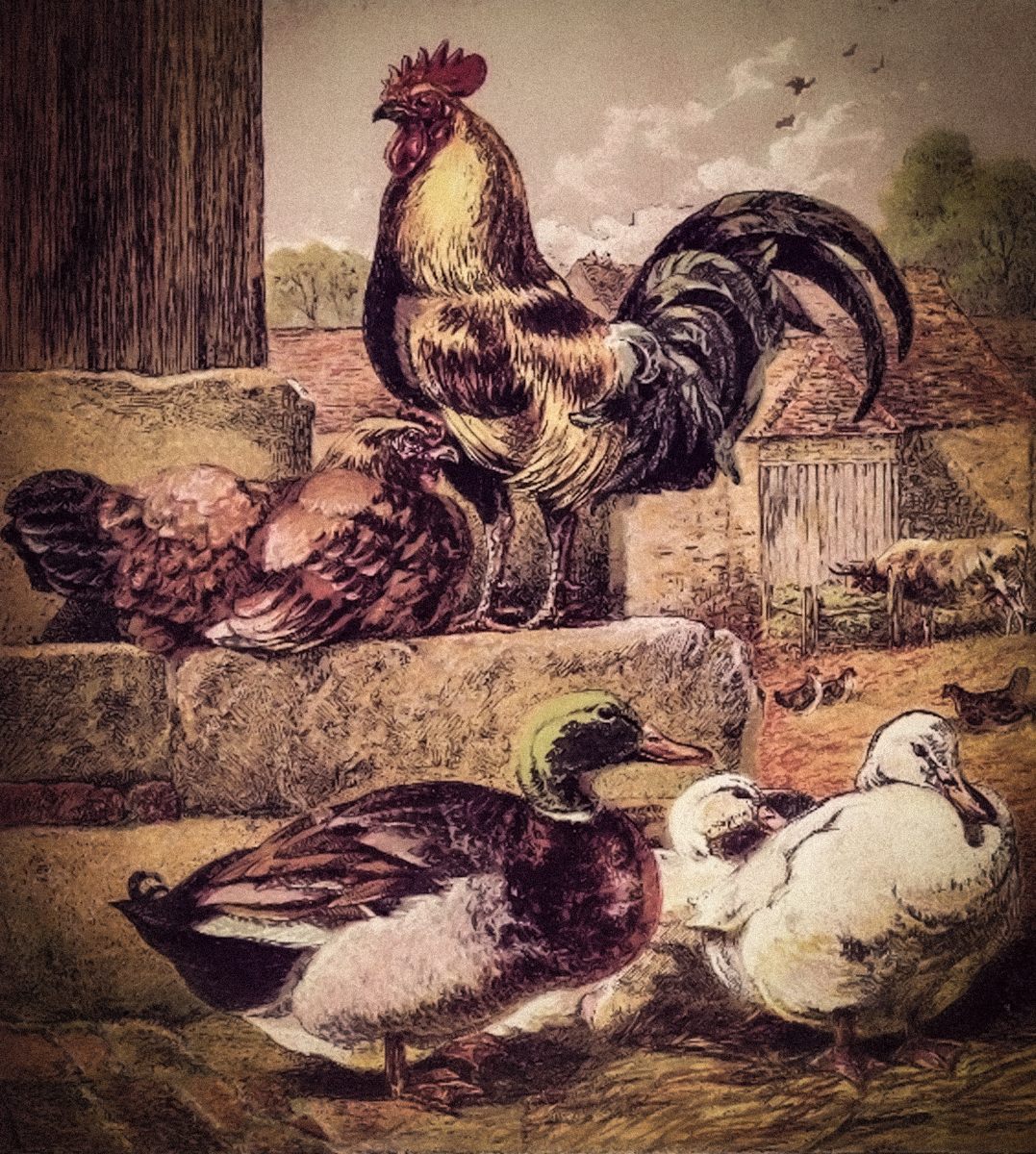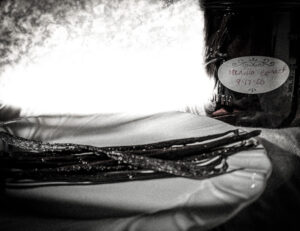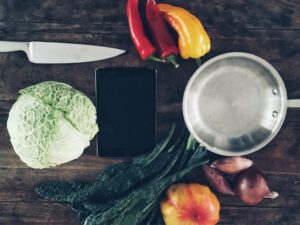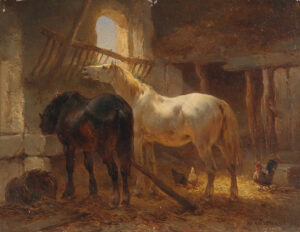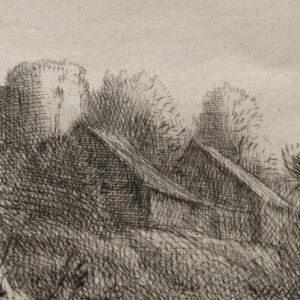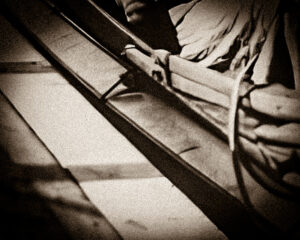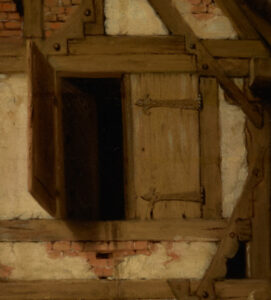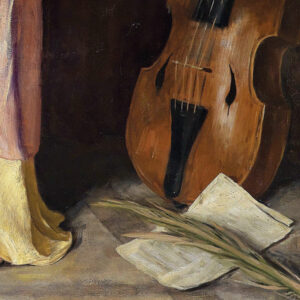Grandpa Had it Right

An Interview with Kyle Ripley, Homesteader in Progress
When Hearth & Field asked Mr. Kyle Ripley when he would like us to come to his property for an interview, Mr. Ripley was quick to reply, “Sunrise!” We pulled into a steep gravel driveway lined with pines and drove about two hundred yards before his partially-built house came into view —the cold rays of early morning sun just beginning to peak out from behind it. Mr. Ripley invited us over to some chairs he had set up in front of an opening where a porch door would eventually go. We gazed out on the surrounding forest and farms.
H&F: Explain to people your dreams for this property. What are you doing out here?
Mr. Ripley Well, it’s been on my heart for several years now to get out in the country. I think I started to think about it when my grandpa wrote his book, Growing Up on the Farm. That must have been close to ten years ago. He wrote about his life — well, growing up on the farm … explaining what life was like on the farm. I think the farm was in Humboldt, which is basically Green Bay.
H&F: Is there still a Humboldt?
Mr. Ripley: There’s Humboldt Road. I think it might be called the Township of Green Bay now. But the old school house is still out there that grandpa went to. It was just one classroom. My great grandpa would bring them to school on the hay wagon with the horses, and they’d sit in the hay. They’d go rain, snow, or shine.
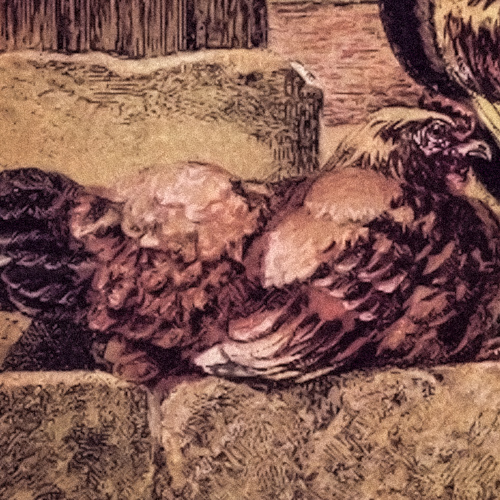 So, he had a lot of different chapters in this book, and it had a lot of different things they would do as far as cooking, planting, harvesting. He wrote about how life on the farm was always joyful. He had a lot of siblings. They were, by most standards poor, but they had more food than they could ever eat. They did a lot of growing and canning, a lot of weed-picking.
So, he had a lot of different chapters in this book, and it had a lot of different things they would do as far as cooking, planting, harvesting. He wrote about how life on the farm was always joyful. He had a lot of siblings. They were, by most standards poor, but they had more food than they could ever eat. They did a lot of growing and canning, a lot of weed-picking.
Anyway, I just noticed how my grandpa’s generation all stayed strong in their faith, but their kids’ kids did not — our generation. So that has also been a factor in my thinking: Why is that? What happened? I think it’s because they all grew up with the agrarian lifestyle — a lot of people did back then — and if they didn’t, they at least had some animals or a basic garden. But our parents didn’t all grow up that way. Now most people grow up where there’s only twenty feet between houses. Or less.
So it’s a different experience, a little less freedom. You can’t just go outside; you have to go to the park.
Where grandpa grew up, they just did whatever they wanted. So they learned how to be a little more independent. You get more mature quickly — make more mistakes when you’re doing stupid stuff. You learn from it, instead of sitting in the house watching the tube.
H&F: What do you think it is about that lifestyle that draws people to faith and to their roots?
Mr. Ripley: I think nature speaks to you. There’s time to contemplate out in nature… Silence is a big part of it. Jesus went to the mountain to listen. There’s not a lot of listening in our modern culture.
My wife and I made the decision to drop social media during Lent a couple of years ago, and, after Lent, I had no reason to go back on. Then we decided to not watch TV. But, I mean, I still have a laptop. That’s the last distraction.
I went to a flip-phone, so that doesn’t distract me. Plus, I figured if I’m living in the country, I need to figure out how to cut back on expenses. So, if we cut out the smart-phone data package and satellite TV, I think we save a hundred and fifty bucks a month. So, multiply that by twenty years, it adds up. So, not only do you get more silence, but you make more money. It’s a double win. We’ve found that being frugal is okay. That was one way we could do ourselves better and save some money for this process.
My wife and I made the decision to drop social media during Lent a couple of years ago, and, after Lent, I had no reason to go back on.
H&F: So, if the dream is to live the way your grandparents grew up, what kind of people do you expect your children to be?
Mr. Ripley: As Fr. Quinn [a local priest] would say, free-range kids. That’s really what it comes down to. Because for kids, they don’t understand what prayer is necessarily, but they know what playing is, and that’s how God created them. So, if they’re doing God’s will and they’re playing, then they’re also praying. So, for them, to play is to pray.
How many kids play? They play video games, but they don’t play with each other enough, which causes issues long term. And part of that is not having to be creative if you’re playing a video game. Whereas, if you’re pushed outside, you have to go figure out how to play. So you learn and create ways to have fun like rolling down a hill.
H&F: Or making swords out of sticks.
Mr Ripley: Exactly. So you have that creative side to it and you actually learn more social skills in the process. If you have a [large] family, the kids all learn to play together.
H&F: So, hopefully, your free-range kids will play a lot.
Mr. Ripley: That’s kind of why I have that glamper [a big tent over a deck that Mr. Ripley made]. I can just send the kids out there.
H&F: For the weekend…
Mr. Ripley: I’m thinking the whole summer — live out there.
H&F: And you are planning on homeschooling then?
Mr. Ripley: Yeah.
H&F: You and Mrs. Ripley ?
Mr. Ripley: Yeah. She’s spent a lot of time in the books. I think a lot of homeschooling is self-learning, though, too. There are a lot of homeschooling programs that, once the kids are old enough, they can just do it themselves.
We thought about the classical schools, but once you’re thirty minutes away in the country, in the winter . . . parents do drive that far, I just can’t imagine the extra hour a day. So we designed the basement to have a school. We have some windows and stuff.
H&F: Do you have a chalkboard yet?
Mr. Ripley: I’ve got a big whiteboard at home.
H&F: That’ll work.
Mr. Ripley: Some friends of ours homeschool, and they have their basement set up as a school. So that inspired us to make sure we planned ahead for space. It’ll work really well.
H&F: Will gardening class be part of school?
Mr. Ripley: That’ll be when you get in trouble. You have to go pick weeds. Instead of timeout, go spend some time outdoors. Yeah, picking weeds isn’t my favorite thing to do.
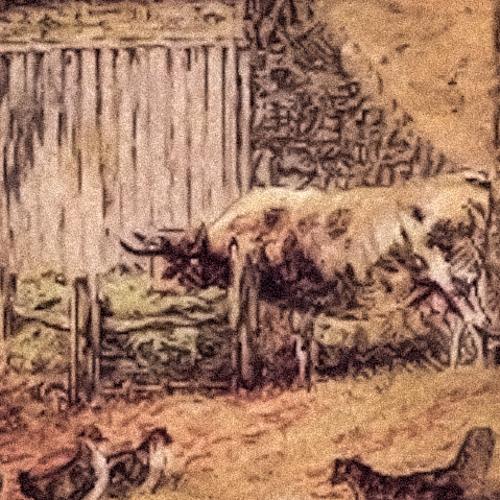 Anyway, I’m envisioning any grassy areas for livestock to raise grass-fed beef. A lot of farmers raise beef, but they have tractors and big fields where they raise corn. It’s a lot of expense to do that, but I can just let the cow get their own food. There’s already grass there, they just have to eat it.
Anyway, I’m envisioning any grassy areas for livestock to raise grass-fed beef. A lot of farmers raise beef, but they have tractors and big fields where they raise corn. It’s a lot of expense to do that, but I can just let the cow get their own food. There’s already grass there, they just have to eat it.
H&F: Will you have chickens?
Mr. Ripley: Yeah, we’ll do chickens. We’ll get a bigger coop for egg layers.
H&F: You could sell them. Or have the kids sell them.
Mr. Ripley: Well, there’s not a lot of money in eggs, but if the kids want to do it, they can do it. But we’ll raise meat birds, forty to fifty at a time.
H&F: You can put them in the freezer.
Mr. Ripley: Yup. What I’ve learned is you can actually rotate your cows from paddock to paddock, but then you move the chickens right behind the cows. They’ll help you spread the manure. They’ll scratch it. So you won’t have any piles of manure, because the chickens will spread it out.
That’s going to be another project, putting up fences for the cows. I figured, once we’re here, if we do a project a year — a bigger project — that’ll be fine.
I’ve got to run an electric fence. That’d be nice to get that done next year, maybe next fall, so the following spring I can get the cows going. But I’ve got a few projects here before then. [He says this looking around at the unfinished house.]
H&F: Is the plumbing all done now?
Mr. Ripley: The rough plumbing is done.
H&F: And you and your dad did a lot of the electrical?
Mr. Ripley: We had to have an electrician come and get us set up, and he’s supervising. We know all the codes, so we’ll be okay. We’re pulling wires and tacking up boxes.
H&F: When did you start building here?
Mr. Ripley: We bought the land the spring after we got married — spring of 2018. That summer, we began to cut some trees, and I built that glamper. I built the deck and put the tent up. It was cool at the time. It still is cool, but we don’t use it like I thought. My brothers come out here for retreats.
So that was that year, and we did our garden that year a little bit. We were pretty bad at it the first year, plus we were in De Pere [a town about twenty miles away] so it was a bit of a drive. And then, the following year, we worked on meeting all the township and county ordinances, which took half a year to set up so we could actually build back here — you’re not allowed to normally, because they want you to be close to the road for fire and emergency purposes.
They don’t want you to take up farmers’ land in the field either. But this worked out, because we’re on a rock ledge, so they can’t farm it. And we kept the house close to the trees instead of out in the field. We have enough land that they allowed it. We got a few parcels created too. We had to do that in the process, because now they’ve changed the rules so that you can’t do it anymore. We did it the week before they changed the rules. I squeezed it all in.
That year … we basically cut trees all year. We put the driveway in last fall. That was a process, one for the books. We seriously cut trees all year. We’ve still got to burn the branches.
So there’s a lot of sweat equity involved in that driveway and a lot of helpers. It takes time to start the agrarian lifestyle, if you’re starting from scratch. You could buy a house that’s out in the country that’s already set up, but this way you can design it how you want it. You can tell your kids you built it. There’s something to that.
My grandparents built their own house. My uncles are pretty handy on my paternal side, and they pretty much all built their own houses or worked together at it. They built my grandparents’ house near Krakow [a town near Green Bay]…. Then on my mom’s side, they had their own house built twice. So it just seemed like something that was in the family.
I called this taming the wild when we first got out here, because we had to tame it.
H&F: It is wild!
Mr. Ripley: I got the permit last fall, and we blasted out the basement right away. It’s all rock under here, so they had to use dynamite. Then, in the spring, we poured the basement. Actually the cement truck got stuck going up our driveway, because the ground was still squishy. We had to bring in some extra gravel.
The past two summers I’ve been helping frame houses so that I could learn how. So now, this summer, some helpers and I framed it.
H&F: So if someone wanted to follow your example and do this themselves, what’s the first step?
Mr Ripley: Well, you need to have a burning desire. I think nowadays it’s easier and easier to find [that desire], if you’re sick of the city life.
H&F: What about if someone can’t get out of the city — how can you simplify, live more in touch with nature, and raise your kids free-range? What’s a city-slicker to do?
 Mr. Ripley: Well, you can always have a garden anywhere, whether it’s in a pot or a raised garden bed. If you have a little bit of land, you can till up the ground. You could tear up your whole yard. Just have a garden instead of grass. You can grow a lot of vegetables in a front yard or backyard. A lot of towns allow chickens now.
Mr. Ripley: Well, you can always have a garden anywhere, whether it’s in a pot or a raised garden bed. If you have a little bit of land, you can till up the ground. You could tear up your whole yard. Just have a garden instead of grass. You can grow a lot of vegetables in a front yard or backyard. A lot of towns allow chickens now.
H&F: Any final thoughts for the world about agrarian lifestyles, how to get started, or things you want to say about this kind of life and what it means?
Mr. Ripley: It’s a way of life. I think it’s Pope Saint John Paul II who talked about a new springtime, and I think that a new springtime is a new way of life in a new time. And there’s this necessity to go backwards — to take two steps back and realize where we came from a little bit. Granted, we do have a little better technology, a little better machinery. It’s easier to accomplish tasks. We have running water, electricity. My grandfather — he didn’t have any of that when he was on the farm. So we have it made in that sense, but it’s about that way of life that the farm provided.
[T]here’s a need for community which is a lot easier to do in the country. I don’t know my neighbors in town, but I know my neighbors here in the country already without living here.
I think, too, that there’s a need for community which is a lot easier to do in the country. I don’t know my neighbors in town, but I know my neighbors here in the country already without living here. And they’ve all helped me out. The neighbor over here — he came and plowed the field for me. The neighbor over here — I bought the land from, and he helped me with the garden. And the neighbor across the road — he brought the scaffolding over for me. So everyone knows you, and you help each other out.
That sense of community is important, and from all my years living in town, I never had that. I think there’s a movement of people who are tired of being tired of the city. They realize there’s more to life, and there’s a different way to live.
If that’s what you’re looking at doing as a person, you’ve got to start planning ahead. Because it’ll take a few years to make it happen. If you haven’t gardened before, start now because it’ll take you three years to figure it out. I thought it’d be a one year process. Apparently it’s more challenging than I realized! And beef-cattle and animals will be the next challenge I’ll have to figure out.
Lots of people are alive, but very few people are joyfully living. There are a lot of people that are at home and don’t know where to go in life. But if you create a way of life that allows you to live with a little more freedom, there’s a joy in that.
